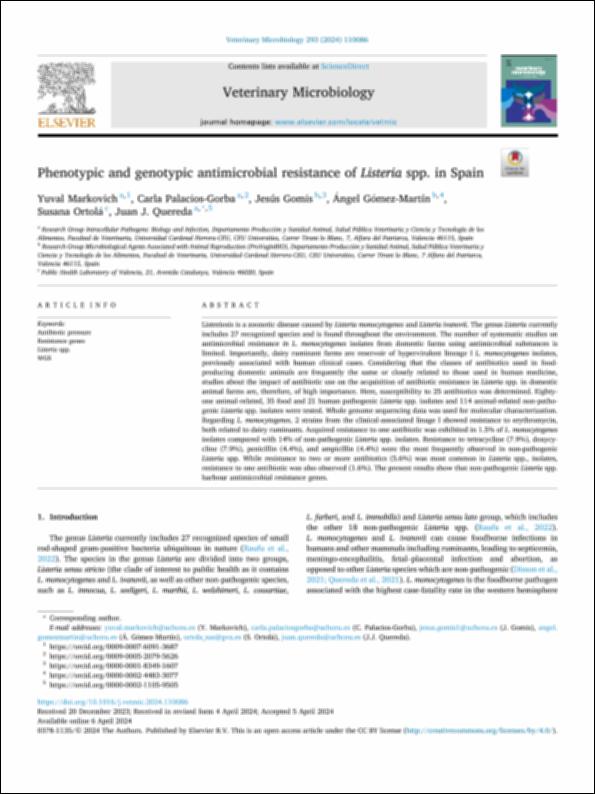Please use this identifier to cite or link to this item:
http://hdl.handle.net/10637/16116Phenotypic and genotypic antimicrobial resistance of "Listeria spp." in Spain
| Title: | Phenotypic and genotypic antimicrobial resistance of "Listeria spp." in Spain |
| Authors : | Markovich, Yuval Palacios Gorba, Carla Gomis Almendro, Jesús Gómez Martín, Ángel Ortolá, Susana Quereda Torres, Juan José |
| Keywords: | Listeria; Listeriosis; Zoonosis; Zoonoses; Enfermedad animal; Animal diseases; Antibioticos; Drugs; Genética animal; Animal genetics; Resistencia a los medicamentos; Drug resistance |
| Publisher: | Elsevier |
| Citation: | Markovich, Y., Palacios Gorba, C., Gomis Almendro, J., Gómez Martín, Á., Ortolá, S. & Quereda, J.J. (2024). Phenotypic and genotypic antimicrobial resistance of "Listeria spp." in Spain. Veterinary Microbiology, vol. 293 (jun.), art. 110086. DOI: https://doi.org/10.1016/j.vetmic.2024.110086 |
| Abstract: | Listeriosis is a zoonotic disease caused by Listeria monocytogenes and Listeria ivanovii. The genus Listeria currently includes 27 recognized species and is found throughout the environment. The number of systematic studies on antimicrobial resistance in L. monocytogenes isolates from domestic farms using antimicrobial substances is limited. Importantly, dairy ruminant farms are reservoir of hypervirulent lineage I L. monocytogenes isolates, previously associated with human clinical cases. Considering that the classes of antibiotics used in food-producing domestic animals are frequently the same or closely related to those used in human medicine, studies about the impact of antibiotic use on the acquisition of antibiotic resistance in Listeria spp. in domestic animal farms are, therefore, of high importance. Here, susceptibility to 25 antibiotics was determined. Eighty-one animal-related, 35 food and 21 human pathogenic Listeria spp. isolates and 114 animal-related non-pathogenic Listeria spp. isolates were tested. Whole genome sequencing data was used for molecular characterization. Regarding L. monocytogenes, 2 strains from the clinical-associated linage I showed resistance to erythromycin, both related to dairy ruminants. Acquired resistance to one antibiotic was exhibited in 1.5% of L. monocytogenes isolates compared with 14% of non-pathogenic Listeria spp. isolates. Resistance to tetracycline (7.9%), doxycycline (7.9%), penicillin (4.4%), and ampicillin (4.4%) were the most frequently observed in non-pathogenic Listeria spp. While resistance to two or more antibiotics (5.6%) was most common in Listeria spp., isolates, resistance to one antibiotic was also observed (1.6%). The present results show that non-pathogenic Listeria spp. harbour antimicrobial resistance genes. |
| URI: | http://hdl.handle.net/10637/16116 |
| Rights : | http://creativecommons.org/licenses/by/4.0/deed.es Open Access |
| ISSN: | 0378-1135 1873-2542 (Electrónico) |
| Supported by: | Acuerdo Transformativo – 2024 |
| Issue Date: | Jun-2024 |
| Center : | Universidad Cardenal Herrera-CEU |
| Appears in Collections: | Dpto. Producción y Sanidad Animal, Salud Pública Veterinaria y Ciencia y Tecnología de los Alimentos |
Items in DSpace are protected by copyright, with all rights reserved, unless otherwise indicated.


